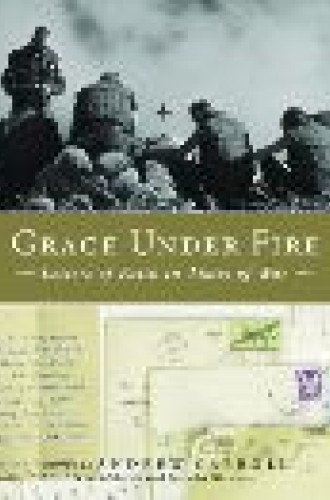Grace Under Fire: Letters of Faith in Times of War
They can laugh about foxhole religion but every front line soldier embraces a little religion and are not ashamed to pray. When you face death hourly and daily you can’t help but believe in Divine Guidance. My faith in God has increased a thousand fold. He has pulled me thru when nothing else could.”
So wrote Sergeant Alvin McAnney from the battlefield in Luxembourg in the fall of 1944, just before he was killed in action.
From the Revolutionary War to the current wars in Afghanistan and Iraq, American men and women have written extraordinary letters home—letters filled with hope and prayer, terror and horror, poetry and passion, and remarkable insight into the meaning of religious faith in the face of the unthinkable. Andrew Carroll, founder of the Legacy Project and editor of the previous collections Letters of a Nation, Behind the Lines and War Letters (which inspired the PBS documentary of the same name), has gathered some 100 letters of grace under duress—letters from the Revolutionary War, the Civil War (in which half a million Americans died—nearly as many as in all other American wars combined), World Wars I and II, Korea, Vietnam, the gulf war and the Iraq war. Carroll concludes the collection with an e-mail exchange between married U.S. Air Force officers, in a time when one in six Americans in the armed forces is female.
Much of what is collected here is, of course, about love, just as many of the final communications from doomed airplanes and towers on September 11 were about love. But there are also some piercing passages that will make your heart shiver:
Private Walter Bromwich to his pastor back home in Pennsylvania, 1918: “How can there be fairness in one man being maimed for life, suffering agonies, another killed instantaneously, while I get out of it safe? Does God really love us individually or does He love His purpose more?”
Sergeant George Syer to his infant son in Texas, 1944: “I have no desire to kill, son, only to save life, but there are times like these that one can’t understand. . . . I go with faith that the Lord shall bring me back safe from the conflict. However, should the Lord decide that my service has ended, and I fall on foreign soil, my faith will be satisfied to its fullest by Him who is wise and better than I could ask or expect. The answer to our faith is always complete, even though the answer is not according to your own will. A paradox, yes, but that is God’s privilege and power.”
Navy lieutenant Sydney Brisker to his parents, after celebrating a Seder on the USS Beaumont, circa 1942: “The ghosts of thousands of years of Jews were with me tonight—from the first refugees of the Bible’s fascist Pharaoh . . . through ages of wandering and persecution—they were with me tonight. In the jungle here of Guadalcanal and the torridness of the African desert, in the biting cold of Iceland and Alaska, and the foggy dampness of England, modern Maccabeans in the uniforms of their beloved countries gathered tonight to celebrate the deliverance of the Jews from the persecution of an ancient Fascism. The modern parallel is quite startling. . . . It can be said, without fear of contradiction, that there are no Jews in the ranks of the enemy.”
“At its heart,” writes Carroll, “this book is not about war. It is about courage, devotion, honor, resilience—and of course faith. It is about individuals who have encountered trials that rival the burdens of Job and have nevertheless persevered. Even if we are not in the military, every one of us wages smaller, more personal battles each day—against despair, sin and doubt—and these letters are a powerful reminder that no matter how tough the contest, there is always reason for hope.”




